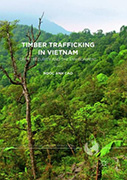Timber Trafficking In Vietnam: Crime, Security And The Environment

Author: Ngoc Anh Cao
Publisher: London: Palgrave Macmillan, 2017. 393p.
Reviewer: Lorraine Elliott | July 2019
This is a fascinating book, based on the author’s PhD thesis at the University of Northumbria. The complexities of this work are such that its purpose is difficult to summarise in a few short sentences. In brief, it deploys an analytical framework that draws on green criminology and human security in tandem with extensive and detailed empirical investigation to examine (i) the nature of illegal logging and associated practices in Vietnam, (ii) the multidimensional and multiscale impacts of such practices; and (iii) possible policy, enforcement and structural responses that might serve to minimise both cause and consequence. The title is perhaps somewhat misleading: in the lexicon of transnational crime, ‘trafficking’ usually refers to illicit trade and related activities that cross borders. This book, on the other hand, focuses almost entirely on the range of activities that are associated with illegal harvesting, production and transportation within Vietnam. As the author indicates, Vietnam is an important location for illegal trade in both timber and non-timber forest products, yet there has been little in-depth analysis of this illegal economic sector. This book does an excellent job in its efforts to fill this gap. It begins with two chapters that provide a detailed overview of the literatures on green criminology and on human security before proceeding to offer a short but very useful overview of the legislative and policy context in Vietnam. This does raise some interesting questions that might warrant further investigation. As Anh notes, the legislative framework for forest protection and forest development (and therefore for the context of forest crimes) involves more 150 legal documents. In other parts of Southeast Asia – Indonesia comes to mind here – this level of complexity in forest legislation and regulation actually makes it more difficult to manage forest protection and the fight against illegal logging and forest crimes. And while the author suggests here that decentralisation might be an effective strategy, this has proved problematic elsewhere.
The intersection of the green criminology and human security themes enables Ngoc Anh Cao to introduce important questions of environmental justice into his analysis. At each stage, this is done thoughtfully by exploring how different levels of illegal harvesting – small scale, medium scale and large scale – might involve different kinds of activities and generate different consequences including for those who are most dependent on forests for their livelihoods. The use of original interview material (all appropriately anonymised) is a key feature of this book. The author has interviewed ‘stakeholders’ at all levels: enforcement agencies, forest protection officers, NGOs, local communities and residents. Particular attention is paid in the analysis to those who facilitate forest crimes associated with illegal logging, and here the author is open in his concerns about the role of elites and the role of corrupt officials. It is difficult to write a book that appeals to both scholars and communities of practice, and that has something important to say to both. But Ngoc Anh Cao has managed this very well indeed. I am delighted to have this work on my bookshelf.
Lorraine Elliott is Professor Emerita in the Department of International Relations in the Coral Bell School of Asia Pacific Affairs at the Australian National University


